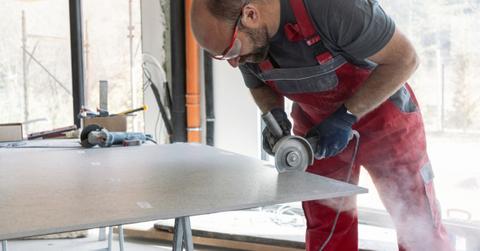Is Your Quartz Countertop Hiding A Dark Secret? All About Silicosis
Some countries are banning engineered stone as a result.
Published Dec. 4 2024, 4:27 p.m. ET

Is your kitchen countertop hiding a dark secret? According to ongoing research about the dangers of fine powders and particulates generated when manufactured stone like quartz is cut, the answer is yes.
That's because these kitchen staples are associated with a condition nicknamed "quartz countertop lung disease." In the past, it has also been called "Potter's rot" or "Grinder's asthma" because employees who work with manufactured stone are especially susceptible to this disease.
You can learn more about silicosis, including what some countries are doing to protect workers against the manufacturing process that causes this to happen, below.
Please note: this article isn't meant as a substitute for medical advice and if you or someone you know thinks you may have silicosis, you should contact your doctor directly.

What is silicosis?
According to the American Lung Association, silicosis is the name of the condition that has become all too common among those whose work involves cutting or grinding quartz countertops.
The disease occurs when silica dust enters the lungs after becoming airborne. Those can then scratch the lungs, which causes scarring over time. With enough scarring, it becomes hard to breathe, which can result in severe illness, the need for a lung transplant, and even death.
The impacts of this condition are becoming so widespread that many legislators are putting laws into place to protect employees, including California, where NPR says the state's Occupational Safety & Health Standards Board plans to create several regulations to help safeguard employees who work in areas where they're exposed to high levels of silica.
The issue isn't one that only impacts U.S. workers, either.
The disease has become so widespread that engineered stone has even been banned in some countries. According to People, Australia banned all use of engineered stone in the country in 2023.
Is silicosis curable?
Unfortunately, there is no cure for silicosis. Treatment is primarily for the management of systems. According to the Cleveland Clinic, those can range from mild to severe and include shortness of breath, a persistent cough that may bring up flehm, fatigue, and unexpected weight loss.
Some things you can do to mitigate the symptoms include using an inhaler to help you improve your ability to move air through your lungs or to use supplemental oxygen.
The Cleveland Clinic also notes that prevention is the best way to deal with silicosis. It also recommends people inindustries more likely to be exposed to silica take added precautions while at work.
That includes those involved in mining, construction, stonemasonry, pottery, foundry work, and more.
What are some alternatives to quartz countertops?
Fortunately, those looking for more ethically minded options for countertops have a lot of options to choose from. And the even better news is that you don't have to sacrifice aesthetics to find what you're looking for.
Concrete, granite, and soapstone are just a few good picks, according to Down 2 Earth Interior Design. Most of these options boast the same benefits that many people look for when they consider quartz, including the timeless style.
Of course, with these picks, they'll have a little less to worry about when it comes to the impact it has on those who are working on making the beautiful countertops for their homes.